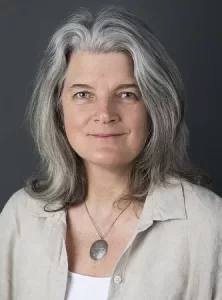
Beverly J. Johnson
Charles A. Dana Professor of Earth and Climate Sciences
Associations
Earth and Climate Sciences
Carnegie Science Hall, Room 214
About
Bev Johnson is a biogeochemist who uses a host of geochemical techniques to explore environmental change over a range of temporal and spatial scales. She specializes in the use of stable carbon and nitrogen isotopes to characterize biogeochemical processes on modern, ancient, and geological time scales.
Bev’s current primary research focuses on understanding carbon cycling in Maine Blue Carbon ecosystems as a means to mitigate climate change. She and colleagues have funding to measure methane emissions, carbon sequestration and carbon stocks in tidally restricted salt marshes, and to co-host a series of SMARTeams workshops to expand capacity for small scale salt marsh restoration. Bev is a member of the scientific working group of the Blue Carbon Initiative, a member of the Coastal and Marine Working Group of the Maine Climate Council and a founding member of the Maine Blue Carbon Network. Bev, colleagues and students also study (1) the history of salt marshes as recorded in salt marsh sediments, (2) paleoceanography in the Gulf of Maine (3) changes in diets of ancient fish and humans along the coast of Maine, through the last 4,000 years, (4) nutrient transfer from anadromous fish into coastal fresh water lakes, and (5) the use of archival datasets to reconstruct long-term changes in water quality on the Androscoggin River.
Bev teaches a first year seminars titled Coastal Hazards (FYS 476), an introductory course on the Earth’s Climate System (EACS 109), intermediate courses in Environmental Geochemistry (EACS 240) and Hydrogeology (ESEA 226), advanced courses in Stable Isotope Geochemistry (EACS 340/EACS 341), and Current Topics in Climate and Environmental Change (EACS 305). Occasionally, Coastal Hazards or Hydrogeology are taught as short term units. Bev often integrates student research projects into her classes. Students investigate various aspects of salt marsh biogeochemistry at all levels of the curriculum, for example.